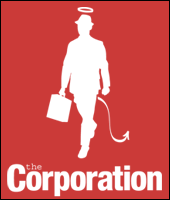February 04, 2004
Are Corporations Insane?
 Just in the past week or so I noticed an article on AlterNet about "The Corporation", a new documentary premiering at the Sundance film in January that also won Sundance's World Cinema Documentary Audience Award, based on the premise that corporations are legally programmed to act like psychopaths – that Enron, WorldCom, etc. aren’t the exception… they’re the rule – and the bigger companies become the worst they behave:
Just in the past week or so I noticed an article on AlterNet about "The Corporation", a new documentary premiering at the Sundance film in January that also won Sundance's World Cinema Documentary Audience Award, based on the premise that corporations are legally programmed to act like psychopaths – that Enron, WorldCom, etc. aren’t the exception… they’re the rule – and the bigger companies become the worst they behave:
-
"The corporation is a paradox," says Mark Achbar, who co-directed and wrote the documentary with Vancouver filmmaker Jennifer Abbott and law professor Joel Bakan. "It generates tremendous wealth, but at tremendous social and environmental cost."
Achbar, best-known for his 1992 documentary "Manufacturing Consent: Noam Chomsky and the Media," says that when he started working on the new film six years ago, it originally was about the anti-globalization movement. But he realized that the growing protests were really against corporate power – and despite the millions of news hours and pages devoted to mergers, acquisitions, marketing strategies and CEO profiles, no one had really examined the history and the character of the corporation itself.
An unlikely subject for a hit film, perhaps. But The Corporation's entertaining mix of interviews, cartoons and old industrial films has already won three "people's choice" prizes at film festivals, including Sundance's World Cinema Documentary Audience Award (sponsored, ironically, by Coca-Cola). In Canada, where "The Corporation" has garnered rave reviews – one compared it to "the best issue of Harper's magazine set to music" – it's currently playing to sold-out theatres across the country.
"Everybody wants to buy their products from a socially responsible corporation, not from some horrible polluter," Achbar says. "The question is, how are we going to resolve this dilemma?"
Here's another excerpt:
-
corporations grew in size and power during the booming 19th century, and their owners wanted to expand their legal rights as well. Since owners or shareholders couldn't be held personally liable, they argued, the corporation itself should be treated as a "person" – thus entitling it to all the protections of the Constitution. The argument was accepted by the U.S. Supreme Court in 1886, in the case of Santa Clara County v. Southern Pacific Railway Company. Consequently, a corporation today has the right to free speech, the right to own property, and the right to due process of law, just as a person does.
So what kind of person is it?
To answer that question, the film ingeniously compares notorious examples of bad corporate behavior to a list of psychiatric symptoms. Nike jumping from sweatshop to sweatshop in ever-poorer countries? That shows an "incapacity to maintain enduring relationships."
Monsanto's refusal to acknowledge the harm caused by Agent Orange? That's an "incapacity to experience guilt." Corporate directors are required by law to do only what's best for the company, regardless of the consequences to anyone else – in other words, a corporation is motivated purely by self-interest. Add up the symptoms, as an FBI consultant does onscreen, and the corporation starts to resemble Ted Bundy.
"The perverse genius of the corporation is not just that it maximizes profit by offloading as many costs (employee education, environmental cleanup) as possible onto the public; it also enables owners and managers to simultaneously claim that each other are ultimately responsible for the company's actions. Even to those at the top, the corporation seems like a monster beyond anyone's control."
I think we all hope corporations are less psychopathic than they seem a lot of the time… but perhaps to truly change the way companies behave, we’ll need to change the legal understanding of what corporations mean to society today.
- Arik
Posted by Arik Johnson at February 4, 2004 01:04 PM | TrackBack "Competitive Intelligence applies the lessons of competition and principles of intelligence to the need for every business to gain awareness and predictability of market risk and opportunity. By doing so, CI has the power to transform an enterprise from also-ran into a real winner, with agility enough to create and maintain sustainable competitive advantage."
"Competitive Intelligence applies the lessons of competition and principles of intelligence to the need for every business to gain awareness and predictability of market risk and opportunity. By doing so, CI has the power to transform an enterprise from also-ran into a real winner, with agility enough to create and maintain sustainable competitive advantage."
